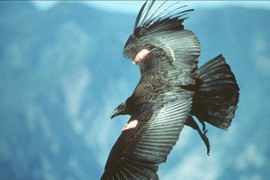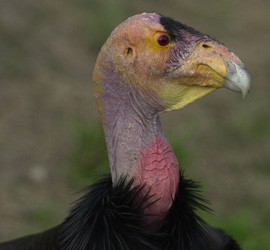Cronkite News has moved to a new home at cronkitenews.azpbs.org. Use this site to search archives from 2011 to May 2015. You can search the new site for current stories.
Environmentalists sue to block lead ammo they say threatens condors
WASHINGTON – Conservation groups have sued the U.S. Forest Service to get a ban on lead ammunition in the Kaibab National Forest, where they say spent ammo is the leading cause of death for endangered condors.
The suit, filed Wednesday in U.S. District Court in Prescott by the Center for Biological Diversity, the Sierra Club and the Grand Canyon Wildlands Council, said spent lead ammo is poisoning condors as well as some other birds.
“Lead is harmful in very small amounts, so it doesn’t take very much to cause lead poisoning,” said Sandy Bahr, director of the Sierra Club’s Grand Canyon Chapter. “This is a toxin that causes enormous harm to wildlife, as well as people.”
The birds get the lead from the remains of animals killed with lead ammunition, either from an animal that escaped the hunter before it died or from the entrails left by hunters after they clean the animal for its meat.
Condors are scavengers and will typically eat the carcass of a dead game animal or its “gut pile,” the suit said, making themselves sick in the process.
By requiring use of non-lead ammo, Bahr said, the conservation groups hope to cut back on the number of deaths to condors, which were reintroduced to Arizona in 1996.
A Forest Service spokeswoman said the agency could not comment on the issue because the case is now under litigation.
But Kathy Sullivan, a condor program coordinator for the Arizona Game and Fish Department, said that while there is a problem with lead poisonings, placing a ban on particular ammo may not be the best way to help save the endangered bird.
“People don’t like to be forced to do something,” Sullivan said. “They like to be asked to be a part of the solution.”
The department already offers a volunteer program where hunters are educated on the harmful effects of lead bullets and are provided non-lead ammunition for free, she said.
If the Forest Service implemented a ban, she said, the Game and Fish Department would probably no longer provide free non-lead ammo to hunters.
“I’m pretty sure the department wouldn’t see the point” of continuing to give out the non-lead ammo, Sullivan said. Non-lead ammo is also more expensive and harder to find in stores, she said.
Sullivan noted that California banned lead-ammunition in a large portion of the southern part of the state in 2008, but she said there has not been any significant decrease in condor deaths since then.
Bahr said she and the other conservationists applaud the Game and Fish Department for offering the volunteer program, but it simply isn’t enough to save the endangered bird.
“We think the Forest Service has a responsibility to remove this toxin from our national forests,” she said.








